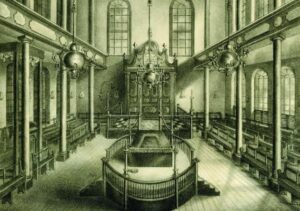Contributor(s): Shared on: 14 October 2021 under the Creative Commons Zero (CC 0) Universal license a Public Domain dedication Categories: Tags: | Contribute a translation | Source (English) |
|---|
|
Thou centre of revolving light
who can thy bounds perceive
or count thy glories by the sight
infinity conceive | |
How great in power did thy hand
with truth and order place
Those mighty systems, countless! grand!
To fill the radiant space. | |
As doth thy works thy glory show
So dost thou condescend
To bless thy creatures here below
And every good extend | |
Then let my thoughts in awful gaze
Wing its astonished way
Climb to the Throne where mercies blaze
To view eternal day | |
Then shall its pinion rest secure
Till my departing breath
Shall from thy mortal frame impure
Escape from silent death | |
My soul shall lead in aerial flight
My sacred transport driven
And soon that pure and holy height
To take its seat in heaven |
“The Glory of God!” written by David Nunes Carvalho was recorded with a few short bars for the melody in the Carvalho Holograph, one of the handwritten manuscripts used by the Reformed Society of Israelites as a supplement for their prayer service. Many thanks to the American Jewish Archives for providing access to the manuscript. –Aharon Varady Source(s) The Glory of God (David Nunes Carvalho – Carvalho Holograph 1826) recto  The Glory of God (David Nunes Carvalho – Carvalho Holograph 1826) verso
David Nunes Carvalho (1784-1860), born and educated in London, England, was a merchant, author, and ḥazzan for the Reformed Society of Israelites in Charleston, South Carolina, the first Reform congregation in the United States. He helped to compile the first Reform prayerbook in English, the fourth oldest Reform prayerbook in the world. The Reformed Society of Israelites (1824-1833) was a group of forty-seven congregants of Ḳ.Ḳ. Beth Elohim, Charleston, South Carolina, who gathered in late 1824 to petition the congregation to modify the service of prayers with an adapted liturgy emphasizing English translations, original hymns, and other modifications. Among other reforms, the group called for shorter services and sermons conducted in English that would relate the weekly parashah to everyday life. Prominent leaders in the group were Isaac Harby (1788–1828), Abraham Moïse (1799-1869), and David Nunes Carvalho (1784-1860). After Harby's death in 1828, the group published a prayerbook (later reprinted by Barnett Elzas/Bloch in 1916). In 1833, the group dissolved but in rejoining Beth Elohim they also managed to succeed in their original mission in putting the congregation on a firm Reform movement trajectory. Aharon Varady (M.A.J.Ed./JTSA Davidson) is a volunteer transcriber for the Open Siddur Project. If you find any mistakes in his transcriptions, please let him know. Shgiyot mi yavin; Ministarot naqeni שְׁגִיאוֹת מִי־יָבִין; מִנִּסְתָּרוֹת נַקֵּנִי "Who can know all one's flaws? From hidden errors, correct me" (Psalms 19:13). If you'd like to directly support his work, please consider donating via his Patreon account. (Varady also translates prayers and contributes his own original work besides serving as the primary shammes of the Open Siddur Project and its website, opensiddur.org.) Read a comment / Leave a comment (moderated) Works of related interest: |







Leave a Reply